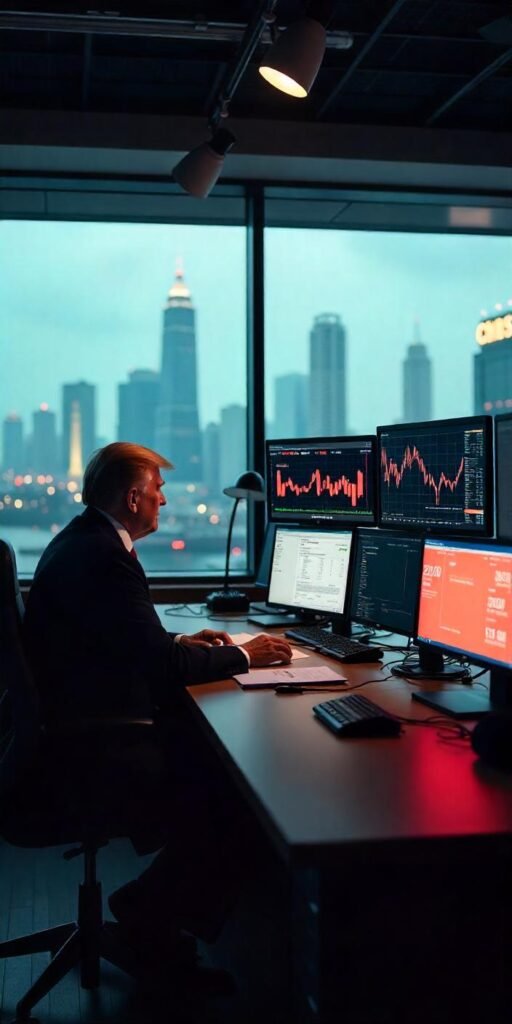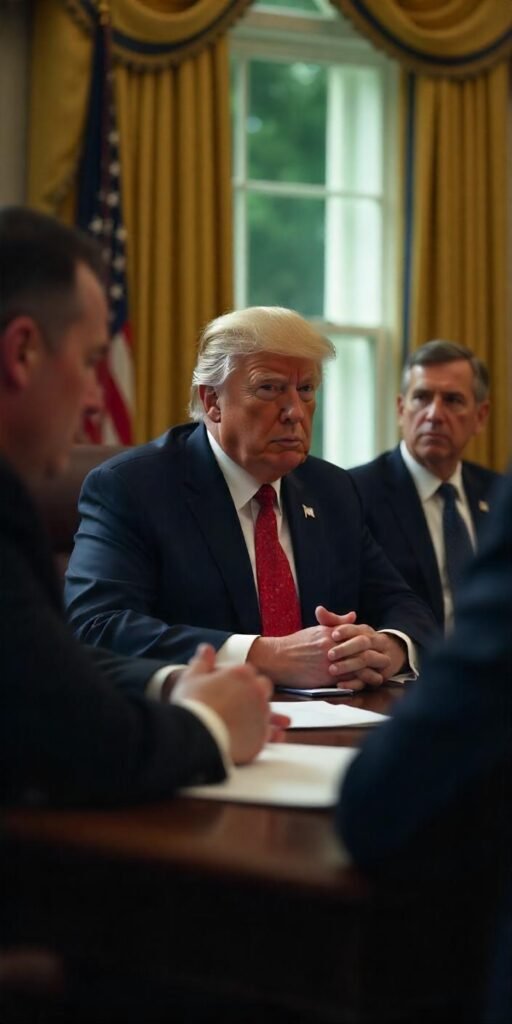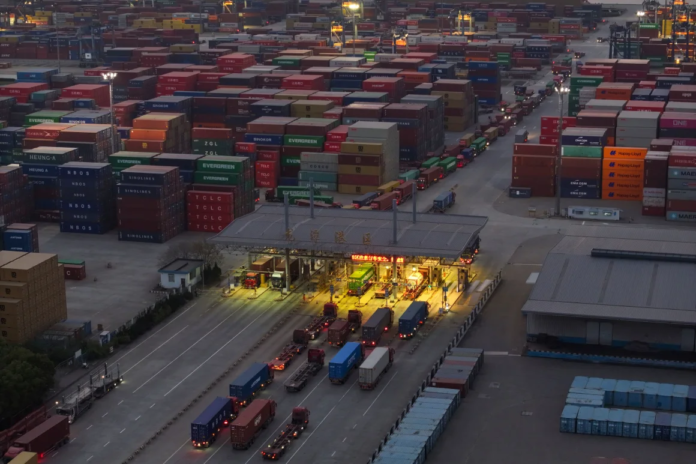
President Donald Trump recently sparked a frontal confrontation with the only country that could defeat the US in a trade war.
The most significant shift in Trump’s worldwide tariff campaign to date is his escalation against China, which is set to face tariffs of at least 104% on goods entering the US. This move has the greatest potential to cause extreme price increases for American residents.
The conflict comes after years of US efforts to resolve alleged Chinese trade violations. It also marks the end of ten or more years of deteriorating ties brought on by a hostile superpower that was once a Pacific rival but now appears eager to confront US hegemony in an assertive and patriotic manner.
Additionally, it marks a somber turning point in a diplomatic partnership that will shape the twenty-first century and the end of a protracted US initiative to keep tensions from turning into a full-fledged trade war, or even worse, between two titans. In response, China announced 84% punitive taxes on US goods imports on Wednesday.
Since President Richard Nixon’s historic visit to Chairman Mao Zedong in an attempt to “open” a remote and destitute country and to create a rift between its leaders and their communist counterparts in the Soviet Union, the US has been attempting to control China’s rise for more than 50 years. Another significant event occurred over 25 years ago when the US forced China to join the World Trade Organization in an effort to lock it into a rules-based, Western-oriented economic system and encourage democratic transformation.

During Trump’s second term, the final failure of those well-meaning initiatives is being exposed. The populist tsunami that brought the president to power was partially a response to globalization, which sent US manufacturing jobs to China and left devastation in its wake.
Deal prospects with China appear bleak.
According to Trump, several countries are keen to negotiate trade agreements to offset the costly US tariffs.
However, China is refusing to join them.
Beijing said it was prepared to battle to “the end” in response to Trump’s caution not to retaliate against a previous 34% levy on top of a first wave of charges. After a rapidly escalating altercation with President Xi Jinping, the US leader had to maintain his credibility on Wednesday by enforcing his threat to levy a massive import tax on goods from the second-largest economy in the world.
White House press secretary Karoline Leavitt stated Tuesday that nations such as China are making a mistake by choosing to react and attempt to intensify their abuses of American workers. “Under President Trump’s leadership, America will not shatter, and he has a steely spine.”
This is the most significant setback in a turbulent week since the US president announced his “Liberation Day” tariffs in the White House Rose Garden, given the enormous amount of personal and political capital Trump has now spent in the confrontation with Xi.
China has been preparing for their confrontation for years, and it is displaying every indication that it believes it can outlast Trump. Furthermore, it is unclear whether Trump and his senior officials are completely aware of how resilient China is or how much harm it could cause to American consumers.
The US president is mistaken if he thought that his “great relationship” with Xi, which he praises virtually every day, would result in a swift Chinese takeover. A trade deal with Beijing that resembled the one from the first Trump administration, which mostly collapsed during the epidemic, doesn’t appear likely to happen anytime soon.

Due to both sides’ hubris, tensions are at an all-time high over trade.
Trump is exaggerating when he says that trade partners have “raped” and “pillaged” the US. But several presidents have expressed similar complaints about Beijing’s actions. Import dumping, market access for US companies, intellectual property theft, currency manipulation, and industrial espionage are all common causes of tensions. Prior White Houses attempted to change China’s conduct by implementing targeted enforcement and other sanctions. The bipartisan consensus in Washington that Beijing poses the biggest military and economic danger to US dominance has been strengthened by years of animosity in the relationship.
Trump, however, is unmatched in his hostility. As the largest trading nation in the world, according to the US Trade Representative’s office, he sees this as his one and maybe last chance to change the US dynamic. Trump told reporters in the Oval Office on Monday, “We have one chance at this.”
However, his approach lacks a clear strategy and is impetuous and indiscriminate.
Additionally, it demonstrates a lack of regard for Chinese authority and dignity, which is a common element in the administration’s interactions with other nations.
Vice President JD Vance, for example, made fun of China last week when he criticized previous US trade policies. He claimed that in order to purchase the goods that those Chinese peasants produce, we borrow money from them. “That is not a formula for financial success. “It’s not a recipe for good jobs in the United States of America, nor is it a recipe for low prices,” Vance said on “Fox & Friends.”
The vice president’s disdainful comments disregarded China’s economic transition. It is currently at the forefront of innovation in a wide range of fields, including energy generation, electric vehicles, and artificial intelligence. Vance’s remarks were denounced by Beijing on Tuesday as “astonishing,” “lamentable,” “ignorant,” and “disrespectful.”
Xi is unable to compromise due to significant political, global, and economic factors.
The brutal Chinese leader portrays himself as a historic force behind the legitimate resurgence of Chinese civilization’s dominance and renown. Thus, it would be impossible to submit to a tough-talking American president. In addition to undermining China’s own might, displaying weakness in front of the United States would be viewed as a loss of face, particularly in Asia.
In contrast, China’s discourse is rife with presumptions that the US is attempting to destroy its political and economic structure. For example, China’s embassy spokesperson in Washington, Liu Pengyu, denounced US tariffs on Tuesday as “abuse” and a violation of China’s “legitimate rights.”
The animosity in Beijing and Washington is being exacerbated by hubris.
The official Chinese media is adamant that America is a failing empire. Trump’s second term as president and the political turmoil he causes are viewed as signs of weakness rather than strength.
China’s claim that the US is an untrustworthy partner and that its version of capitalism combined with political control is a better model is further supported by Trump’s antics and attacks on US friends, particularly those in Southeast Asia.
Xi’s reorientation and modernization of the Chinese economy are also key factors in China’s confidence ahead of what may turn out to be a protracted trade war with the United States.
According to Lily McElwee, an adjunct fellow at the Center for Strategic and International Studies, “I think if you are Xi Jinping right now, you’re thinking, ‘Well, hey, on the metrics that I care about — technological resilience and self-reliance, we are doing okay, these tariffs may not immediately impact us.” According to McElwee, president and CEO of the Phoenix Committee on Foreign Relations, Xi might also think that China has “retaliatory tools that (it) can impose that will be costly to the United States as well” in addition to its core capabilities.
Unlike Trump, who is concerned about how a trade war would affect impending elections like the congressional midterms next year, Xi is a true authoritarian leader. Furthermore, Xi might believe he can afford to hurt the Chinese more than Trump can hurt Americans, even though public opinion is still significant in China.
Americans might file a lawsuit for trade peace on terms that benefit Beijing if US inflation spikes and triggers a recession.

Americans will soon experience severe economic hardship.
American customers are going to suffer.
According to the USTR, China has emerged as the United States’ largest foreign supplier of products, making up as much as sixteen percent of all imports in recent years. It controls the market for toys, computers, and smartphones; when the new tariffs take effect, they will probably see steep price increases that will make them unaffordable for many Americans. China now faces an effective average tariff rate of 125% when combined with Biden administration taxes on the country, which increased on Trump’s first-term levies.
Trump may have been so fixated on locating alternate supply sources in countries like Greenland and Ukraine because Beijing can also impose additional sanctions on the US, such as suspending export permits for rare earth minerals that are essential to the US tech sector.
Chinese leaders may decide to impose further artificial restrictions on the flow of commodities to the US after witnessing the devastating inflationary impact of supply chain shortages during the pandemic in the US. Commercial companies and American legislation may be prohibited from doing business in China. Additionally, Beijing might shock the American agricultural heartland by restricting the import of sorghum and soy beans. Although all of these actions would harm both Chinese and Americans, they would show Xi’s ability to exact revenge.
Small companies are also at risk. Giants like Apple can look for other manufacturing locations, such as in India, but US companies that depend on Chinese products and parts will be severely impacted.
Alex Jacquez, a former special assistant for Economic Development and Industrial Strategy to President Joe Biden, stated that “if you are a small business, especially on the import side or the input side, there is going to be pain.” There will be further economic repercussions. There is a drag on GDP, which will have an impact on the labor market. Jacquez stated, “Inflationary pressure is what you are looking at.”
One of the issues here is that the strategy lacks direction and logical thought.
New developments have been added to this story.






